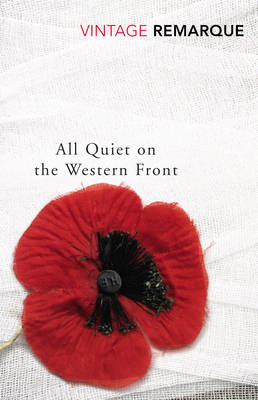 Now he is lying there – and for what reason? Everybody in the whole world ought to be made to walk past his bed and be told: ‘This is Franz Kemmerich, he’s nineteen and a half, and he doesn’t want to die! Don’t let him die!
Now he is lying there – and for what reason? Everybody in the whole world ought to be made to walk past his bed and be told: ‘This is Franz Kemmerich, he’s nineteen and a half, and he doesn’t want to die! Don’t let him die!
All Quiet on the Western Front is a book that never loses force. Originally I was only going to read war books I hadn’t read before but why leave out the best? I have read this book before and am pleased to report that it is still just as devastating and worthwhile the second time around. I’m quite confident that by the end of this reading project I will still recommend this book as the one to read.
I won’t go into the plot, because I’m sure everyone knows the story: German soldier fighting on the Western front in WWI. The fact that the novel is about German soldiers highlights why we should commemorate all the soldiers who died in the war, not just the ones from our own country. The most important part of the book is that you could be reading about any soldier from either side. This post is heavy on the quotes because Remarque’s writing is somehow both horrific and beautiful, and puts into words what I couldn’t begin to articulate.
Paul Baumer is just about as experienced as you can manage to be for a front line soldier, which makes it easy to forget that he is only nineteen. During the battles he fights instinctively, acts compassionately, appears fearless. It isn’t until after the fighting stops that I remembered how young and destroyed he really is:
The trucks roll monotonously onwards, the shouts are monotonous , the falling rain is monotonous. It falls on our heads and on the heads of the dead men up at the front of the truck, on the body of the little recruit with a wound that is far too big for his hip, it’s falling on Kemmerich’s grave and it’s falling in our hearts.
That is the quote I remember best from reading this book a few years ago. It completely captures the sheer despair and futility of these soldiers prolonging their lives. Yes, they can survive one battle but in order to face what? Paul and his comrades occasionally talk about what they would do if the war finishes and the answers tend to revolve around satisfying the body; girls, food, alcohol, sleep. Any discussion beyond that is depressing; they are the lost generation and they know it.
We’re no longer young men. We’ve lost any desire to conquer the world. We are refugees. We are fleeing from ourselves. From our lives. We were eighteen years old, and we had just begun to love the world and to love being in it; but we had to shoot at it. The first shell to land went straight for our hearts. We’ve been cut off from real action, from getting on, from progress. We don’t believe in those things anymore; We believe in the war.
The absorption of young men’s lives into the war is something I don’t always consider when thinking about war novels. Yes, most of their time is taken up with fighting and whilst they get leave to see their families perhaps this isn’t the relief you might have thought it was. The soldiers think about home with nostalgia – firmly anchored in the past:
The [memories] are silent because that is something incomprehensible to us. There is no silence at the front and the spell of the front is so strong that we are never away from it. […] The quietness is the reason why all these images awaken in us not so much desire as sadness – a vast and inexplicable melancholy. These scenes existed once – but they will never return. They are gone, they are another world, a world that is in the past for us.
Surprisingly some of the most upsetting parts of the novel happen when Paul is at home on leave. The soldiers have an unspoken, unanimous decision to never reveal the reality of what happens at the front to their families. Consequently Paul has to see and do horrible things and never speak of them to anyone who cares about him, which makes for agonising reading. Is it better that his family didn’t know what his life had become? Does morale win wars or prolong them?
Can there ever be a novel that should be required for everyone to read? Are the World Wars a Western concern? Completely simplifying what could be a lengthy argument, my opinion is that war is war and everyone should know what it really costs.








